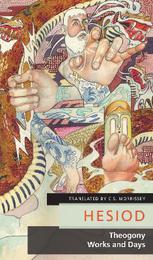
|
Theogony / Works and Days
Paperback / softback
Main Details
| Title |
Theogony / Works and Days
|
| Authors and Contributors |
By (author) Hesiod
|
|
Translated by C.S. Morrissey
|
|
Foreword by Roger Scruton
|
|
Contributions by Eric Voegelin
|
| Physical Properties |
| Format:Paperback / softback | | Pages:144 | | Dimensions(mm): Height 216,Width 127 |
|
| Category/Genre | Poetry by individual poets
Ancient religions and mythologies |
|---|
| ISBN/Barcode |
9780889227002
|
| Classifications | Dewey:881.01 |
|---|
| Audience | |
|---|
|
Publishing Details |
| Publisher |
Talon Books,Canada
|
| Imprint |
Talon Books,Canada
|
| Publication Date |
25 September 2012 |
| Publication Country |
Canada
|
Description
Philosopher C.S. Morrissey adapts Hesiod's two great works, Theogony and Works and Days, taking into account the poet's essential meditative insights that paved the way for the subsequent achievements of Greek philosophy,most notably of Plato, and thereby gave a distinctive shape to all of Western philosophy. Theogony recounts the genesis of the first generations of the Greek gods and recollects how Zeus used both force and persuasion to establish his cosmic reign of justice. Works and Days tells the story of the origin and ordination of human beings within this cosmos and their perennial struggle to win order from disorder in a world overwhelmed by harsh sorrows and injustice. In the wake of personal adversity and suffering, Hesiod was inspired by the Muses to sing out against the untruth of society and to disclose the truth about justice in the cosmos. Theogony, which won him his laurels in a poetic competition, begins by telling of how the Muses chose him as an individual vessel of inspiration, to be a rival to Homer and the old myths with a newer vision of the struggle for justice among the gods. In Works and Days, Hesiod includes these autobiographical details within a reflection on the two-fold role of competition in life: "the bad strife" is visible everywhere in the manifold forms of universal disorder, although "the good strife" is part of the struggle to maintain order in the wake of chaos and the primeval void. These new translations are contextualized with a foreword by distinguished philosopher Roger Scruton and text by the late philosopher and historian Eric Voegelin, who argues the magnitude of Hesiod's influence on Greek philosophy and Western history, and how his sublime contribution to literature has formed a signal bridge between myth and metaphysics.
Author Biography
C.S. Morrissey is a professor of philosophy at Redeemer Pacific College, the Catholic liberal arts college at Trinity Western University in Langley, British Columbia, where he also teaches courses in the Latin language and in Greek and Roman history. He studied Greek and Latin at the University of British Columbia and has taught courses in these languages and in other classical subjects at Simon Fraser University. Morrissey specializes in philosophical theology and his recent focus has been on its genesis in the monotheistic speculations of Hesiod and Plato. He has also published on the mediaeval Latin philosophy of Thomas Aquinas and his commentatorial tradition, which includes John Poinsot, a.k.a. John of St. Thomas, from whom we may trace a foundational doctrine of signs for the interdisciplinary field of semiotics. Morrissey's current research explores how Eric Voegelin's philosophical studies of the historical processes of symbolization complement the pioneering interdisciplinary work by the semiotician and linguist Thomas Albert Sebeok towards a global semiotics.
|